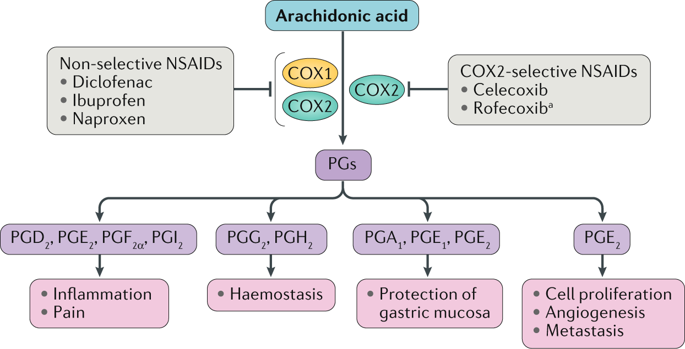当前位置:
X-MOL 学术
›
Nat. Rev. Cardiol.
›
论文详情
Our official English website, www.x-mol.net, welcomes your
feedback! (Note: you will need to create a separate account there.)
Cardiovascular effects and safety of (non-aspirin) NSAIDs.
Nature Reviews Cardiology ( IF 41.7 ) Pub Date : 2020-04-22 , DOI: 10.1038/s41569-020-0366-z Anne-Marie Schjerning 1, 2 , Patricia McGettigan 3 , Gunnar Gislason 2, 4
Nature Reviews Cardiology ( IF 41.7 ) Pub Date : 2020-04-22 , DOI: 10.1038/s41569-020-0366-z Anne-Marie Schjerning 1, 2 , Patricia McGettigan 3 , Gunnar Gislason 2, 4
Affiliation

|
Nonsteroidal anti-inflammatory drugs (NSAIDs) are effective, widely used analgesics. For the past 2 decades, considerable attention has been focused on their cardiovascular safety. After early studies indicating an association between NSAID use and increased risks of heart failure and elevated blood pressure, subsequent studies found a link between NSAID use and an increased risk of thrombotic events. Selective cyclooxygenase 2 (COX2) inhibitors (also known as coxibs) have been associated with the greatest risk of adverse vascular effects but concern also relates to non-selective NSAIDs, especially those with strong COX2 inhibition such as diclofenac. Although NSAID use is discouraged in patients with cardiovascular disease, pain-relief medication is often required and, in the absence of analgesics that are at least as effective but safer, NSAIDs are frequently prescribed. Furthermore, non-prescription use of NSAIDs, even among people with underlying cardiovascular risks, is largely unsupervised and varies widely between countries. As concern mounts about the disadvantages of alternatives to NSAIDs (such as opioids) for pain management, the use of NSAIDs is likely to rise. Given that the pharmaceutical development pipeline lacks new analgesics, health-care professionals, patients and medicine regulatory authorities are focused on optimizing the safe use of NSAIDs. In this Review, we summarize the current evidence on the cardiovascular safety of NSAIDs and present an approach for their use in the context of holistic pain management.
中文翻译:

(非阿司匹林)非甾体抗炎药的心血管作用和安全性。
非甾体抗炎药(NSAIDs)是有效且广泛使用的镇痛药。在过去的20年中,他们的心血管安全性受到了相当大的关注。在早期研究表明使用NSAID与心力衰竭和血压升高的风险增加之间存在关联之后,随后的研究发现NSAID使用与血栓事件风险增加之间存在联系。选择性环氧合酶2(COX2)抑制剂(也称为coxibs)与不良血管作用的最大风险相关,但也涉及非选择性NSAID,特别是对COX2抑制作用强的非甾体类抗炎药,例如双氯芬酸。尽管不建议在患有心血管疾病的患者中使用NSAID,但通常仍需要止痛药,并且在没有至少有效但更安全的止痛药的情况下,经常开具NSAID。此外,即使在有潜在心血管疾病风险的人群中,非处方使用非甾体抗炎药在很大程度上不受监督,而且各国之间存在很大差异。随着人们越来越担心使用NSAID替代品(例如阿片类药物)来治疗疼痛,NSAID的使用可能会增加。鉴于药品开发渠道缺乏新的止痛药,因此医疗保健专业人员,患者和药品监管机构将重点放在优化NSAID的安全使用上。在本综述中,我们总结了有关非甾体抗炎药的心血管安全性的最新证据,并提出了在整体疼痛管理中使用它们的方法。在很大程度上不受监督,并且各国之间差异很大。随着人们越来越担心使用NSAID替代品(例如阿片类药物)来治疗疼痛,NSAID的使用可能会增加。鉴于药品开发渠道缺乏新型止痛药,因此医疗保健专业人员,患者和药品监管机构都将重点放在优化NSAID的安全使用上。在这篇综述中,我们总结了关于非甾体抗炎药的心血管安全性的现有证据,并提出了一种在整体疼痛管理中使用它们的方法。在很大程度上不受监督,并且各国之间差异很大。随着人们越来越担心使用NSAID替代品(例如阿片类药物)来治疗疼痛,NSAID的使用可能会增加。鉴于药品开发渠道缺乏新的止痛药,因此医疗保健专业人员,患者和药品监管机构将重点放在优化NSAID的安全使用上。在这篇综述中,我们总结了关于非甾体抗炎药的心血管安全性的现有证据,并提出了一种在整体疼痛管理中使用它们的方法。患者和药品监管部门致力于优化NSAID的安全使用。在这篇综述中,我们总结了关于非甾体抗炎药的心血管安全性的现有证据,并提出了一种在整体疼痛管理中使用它们的方法。患者和药品监管部门致力于优化NSAID的安全使用。在这篇综述中,我们总结了关于非甾体抗炎药的心血管安全性的现有证据,并提出了一种在整体疼痛管理中使用它们的方法。
更新日期:2020-04-24
中文翻译:

(非阿司匹林)非甾体抗炎药的心血管作用和安全性。
非甾体抗炎药(NSAIDs)是有效且广泛使用的镇痛药。在过去的20年中,他们的心血管安全性受到了相当大的关注。在早期研究表明使用NSAID与心力衰竭和血压升高的风险增加之间存在关联之后,随后的研究发现NSAID使用与血栓事件风险增加之间存在联系。选择性环氧合酶2(COX2)抑制剂(也称为coxibs)与不良血管作用的最大风险相关,但也涉及非选择性NSAID,特别是对COX2抑制作用强的非甾体类抗炎药,例如双氯芬酸。尽管不建议在患有心血管疾病的患者中使用NSAID,但通常仍需要止痛药,并且在没有至少有效但更安全的止痛药的情况下,经常开具NSAID。此外,即使在有潜在心血管疾病风险的人群中,非处方使用非甾体抗炎药在很大程度上不受监督,而且各国之间存在很大差异。随着人们越来越担心使用NSAID替代品(例如阿片类药物)来治疗疼痛,NSAID的使用可能会增加。鉴于药品开发渠道缺乏新的止痛药,因此医疗保健专业人员,患者和药品监管机构将重点放在优化NSAID的安全使用上。在本综述中,我们总结了有关非甾体抗炎药的心血管安全性的最新证据,并提出了在整体疼痛管理中使用它们的方法。在很大程度上不受监督,并且各国之间差异很大。随着人们越来越担心使用NSAID替代品(例如阿片类药物)来治疗疼痛,NSAID的使用可能会增加。鉴于药品开发渠道缺乏新型止痛药,因此医疗保健专业人员,患者和药品监管机构都将重点放在优化NSAID的安全使用上。在这篇综述中,我们总结了关于非甾体抗炎药的心血管安全性的现有证据,并提出了一种在整体疼痛管理中使用它们的方法。在很大程度上不受监督,并且各国之间差异很大。随着人们越来越担心使用NSAID替代品(例如阿片类药物)来治疗疼痛,NSAID的使用可能会增加。鉴于药品开发渠道缺乏新的止痛药,因此医疗保健专业人员,患者和药品监管机构将重点放在优化NSAID的安全使用上。在这篇综述中,我们总结了关于非甾体抗炎药的心血管安全性的现有证据,并提出了一种在整体疼痛管理中使用它们的方法。患者和药品监管部门致力于优化NSAID的安全使用。在这篇综述中,我们总结了关于非甾体抗炎药的心血管安全性的现有证据,并提出了一种在整体疼痛管理中使用它们的方法。患者和药品监管部门致力于优化NSAID的安全使用。在这篇综述中,我们总结了关于非甾体抗炎药的心血管安全性的现有证据,并提出了一种在整体疼痛管理中使用它们的方法。































 京公网安备 11010802027423号
京公网安备 11010802027423号